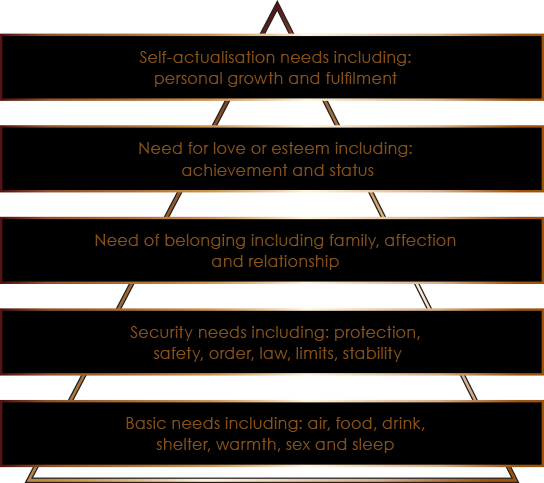
In his book, Motivation and Personality (1970 2nd edition Harper & Row) psychologist Maslow postulated that human behavior is motivated by a hierarchy of basic needs. Once lower needs are gratified, the organism – or human – will escalate to higher needs. A basic need will dominate behavior if it is thwarted or when the organism is deprived of it. Once the need is gratified, it releases its domination of the organism.
Physiological needs comprise the bottom tier of the hierarchy. These are our basic human needs, such as hunger, thirst, sleep, sex and warmth. If a need has been continuously satisfied in the past, we are better equipped to deal with its deprivation in future. If not, we may always subconsciously yearn for the gratification of that unfulfilled basic need.
The second tier of needs encompass those for safety, including such concepts such as security, stability, dependency, protection and freedom from fear as well as from anxiety and chaos, need for structure, order, law, limits, strength in the protector, etc. Maslow explains should these needs not be fulfilled “ the organism may equally well b wholly dominated by them… and we may then fairly describe the whole organism as asafety-seeking mechanism.”
Maslow identified the third tier as the need for belongingness and love. Losing touch with our roots, relocating often and changing schools, forced resettlement, war, etc will all impact on our sense of belonging. If we never experience receiving love, how can we be expected to give it?
The fourth tier comprises “esteem” needs. According to Maslow these are the desire for strength, achievement, adequacy, mastery and competence, confidence, status, glory dominance, recognition, dignity and appreciation. To men, money represents status and recognition in the eyes of other men.
The fifth and last tier, is the need for self-actualization. To Maslow, this represents a human being’s need to achieve his / her highest altruistic potential.
Characteristics Of Self-Actualized People
1 More Efficient Perception Of Reality And More Comfortable Relations With It:
They have an unusual ability to detect the spurious, the fake and the dishonest in a personality and in general to judge people correctly and efficiently. They do not cling to the familiar, nor is their quest for the truth a catastrophic need for certainty, safety, definiteness, and order. They can be, when the total objective situation calls for it, comfortably disorderly, sloppy, anarchic, chaotic, vague, doubtful, uncertain, indefinite, approximate, inexact or inaccurate.
2 Acceptance (Self, Others, Nature)
They tend to be good to animals, hearty in their appetites and enjoying themselves without regret or shame or apology. Closely related to their self-acceptance and to acceptance of others is 1) their lack of defensiveness, protective coloration, or pose and 2) their distaste for such artificialities in others. Cant, guile, hypocrisy, front, face, playing a game, trying to impress in conventional ways: these all are absent in themselves to an unusual degree.
3 Spontaneity, Simplicity And Naturalness
Their unconventionality is not superficial but essential and internal. It is their impulses, thought, consciousness that are so unusually unconventional, spontaneous and natural. Apparently recognizing that the world of people in which they live could not understand or accept this, and since they have no wish to hurt them or fight with them over every triviality, they will go through the ceremonies and rituals of convention with a good-humored shrug and with the best possible grace. When they consider something very important, it will be at such moments that their essential lack of conventionality appears, and not with the average Bohemian or authority-rebel, who makes great issues of trivial things and who will fight some unimportant regulation as if it were a world issue.
One consequence of this characteristic is that they have codes of ethics that are relatively autonomous and individual rather than conventional. The unthinking observer might sometimes believe them to be unethical, since they break down not only conventions but laws when the situation seems to demand it. Sometimes they let themselves go deliberately, out of momentary irritation with customary rigidity or with conventional blindness. They may for instance, be trying to teach someone or they may be trying to protect someone from hurt or injustice or they may sometimes find emotions bubbling up from within them that are so pleasant or even ecstatic that it seems sacrilegious to suppress them.
Their ease of penetration to reality, their closer approach to an animal-like or childlike acceptance and spontaneity imply a superior awareness of their own impulses, desires, opinions and subjective reactions in general.
4 Problem Centering
They are problem centered rather than ego centered. They generally are not problems for themselves and are generally not much concerned about themselves. Eg as contrasted with the ordinary introspectiveness that one finds in insecure people. These individuals customarily have missions in life, some task to fulfill, some problem outside themselves which enlists much of their energies.
They work within a framework of values that are broad and not petty, universal and not local, and in terms of a century rather than the moment. In a word, these people are all in one sense or another philosophers, however homely.
5 The Quality Of Detachment: The Need For Privacy
All of them can be solitary without harm to themselves and without discomfort. Furthermore it is true for almost all that they positively like solitude and privacy to a definitely greater degree than the average person.
They have an ability to concentrate to a degree not usual for ordinary men or women. Intense concentration produces as a by-product such phenomena as absent-mindedness, the ability to forget and to be oblivious of outer surroundings.
Another meaning of autonomy is self-decision, self-government, being an active, responsible, self-disciplined, deciding agent rather than a pawn or helplessly determined by others.
6 Autonomy: Independence of Culture And Environment: Will Active Agents
They are self contained. They have become strong enough to be independent of the good opinion of other people or even their affection.
7 Continued Freshness of Appreciation
They have a wonderful capacity to appreciate again and again freshly and naively the basic goods of life, with awe, pleasure, wonder and even ecstasy, however stale these experiences may have become to others. They derive ecstasy, inspiration, and strength from the basic experiences of life and none of them will get this same sort of reaction from going to a night club or getting a lot of money or having a good time at a party.
8 The Mystic Experience: The Peak Experience
Peakers seem also to live in the realm of Being, of poetry, esthetics, symbols, transcendence, spirituality, of the mystical, personal non-institutional sort.
9 Gemeinschaftsgefuhl
They have for human beings in general a deep feeling of identification, sympathy, and affection in spite of the occasional anger, impatience, or disgust. They have a genuine desire to help the human race.
Very few people actually understand them, however much they may like them. However far apart from other people they feel at times, they nevertheless feel a basic underlying kinship with these creatures whom they have to regard with, if not condescension, at least the knowledge that they can do many things better than others can, that they can see things others cannot see, that the truth is as clear to them as it is hidden to others.
10 Interpersonal Relations
They are capable of more fusion, greater love, more perfect identification, more obliteration of the ego boundaries than other people would consider possible. The other members of these relationships are likely to be healthier and closer to self-actualization than the average. There is high selectiveness here. Their circle of friends is rather small. Devotion is not a matter of a moment, but requires a good deal of time and dedication.
Their love of humankind does not lack discrimination. The fact is they can and do speak realistically and harshly of those who deserve it, especially of the hypocritical, the pretentious, the pompous or the self-inflated. Their hostile reactions to others are 1) deserved and 2) for the good of the person attacked or for someone else’s good.
Their admirers are apt to demand more than the self-actualized person is willing to give. These devotions can be rather embarrassing, distressing and even distasteful to the self-actualizing individual, since they often go beyond ordinary bounds. The usual picture is of them being kind and pleasant when forced into these relationships, but ordinarily trying to avoid them as gracefully as possible.
11 Democratic Character Structure
They can be and are friendly with anyone of suitable character regardless of class, education, political belief, race or colour. As a matter of fact it seems as if they are not even aware of these differences, which are for the average person so obvious and important.
They find it possible to learn from anybody who has something to teach them, no matter what other characteristics the other person may have. They have a humility of a certain type. These individuals, themselves elite, select for their friends elite, but it is an elite of character, capacity and talent, rather than of birth, race, blood, family, age, youth, fame or power.
They are more likely rather than less likely to counterattack against evil men and evil behaviour. They are far less ambivalent, confused or weak-willed about their own anger than average people are.
12 Discrimination Between Means And Ends: Between Good And Evil
These individuals are strongly ethical, they have definite moral standards, they do right and do not do wrong. Their notions of right and wrong and of good and evil are often not conventional ones.
They believe in God, but describe God more as a metaphysical concept as a personal figure.
13 Philosophical Unhostile Sense Of Humour
Characteristically what they consider humor is more closely allied to philosophy than anything else. They do not poke fun at other people’s expense.
14 Creativeness
Each one of them shows in one way or another a special kind of creativeness or originality or inventiveness that has certain peculiar characteristics. These individuals are less inhibited, less constricted, less bound, in a word, less enculturated.
15 Resistence To Enculturation; Transcendence Of A Particular Culture
They get along with the culture in various ways, but they resist enculturation in a profound and meaningful sense. Their yielding to convention is apt to be rather casual and perfunctory, with cutting corners in favour of directness, honesty, saving energy, etc. In a pinch, when yielding to conventions is too annoying or too expensive, the apparent conventionality reveals itself for the superficial thing it is and tossed of as easily as a cloak.
They are not against fighting, but are against ineffective fighting.
16 Dropping Of Defenses In Love Relationships
They have a tendency to more and more spontaneity, dropping of defenses, dropping of roles and of trying and striving in the relationship. As the relationship continues, there is a growing intimacy and honesty and self-expression, which at its height is a rare phenomenon.
“We can love a person only to the extent that we are not threatened by him; we can love only if his reaction to us or to those things which affect us, are understandable to us.” Sex and love can be and most certainly are perfectly fused with each other in these people. They can tolerate the absence of sex more easily and will easily give it up, because it came without love and affection.
However sex can be wholeheartedly enjoyed, far beyond the possibility of the average person, but at the same time it does not play any central role in their philosophy of life. The self-actualizing person can simultaneously enjoy sex so much more intensely than the average person, yet at the same time consider it so much less important in their total frame of reference.
They have an easy relationship with members of the opposite sex, along with the casual acceptance of the phenomenon of being attracted to other people, but at the same time these individuals do rather less about this attraction than other people. Their talk about sex is considerably more free and casual and unconventional than the average.
Healthier men are more attracted by intelligence, strength, competence in women than threatened by it, as is so often the case with the uncertain male. Self-actualizing women can incorporate their “male qualities” without sacrificing their femininity.
Their love relationships are characterized by fun, merriment, elation, feeling of well-being and gaiety. In spite of the fact that their love lives often reach great peaks of ecstasy, it is also easily compared to the games of children and puppies. They have the rare ability to be pleased rather than threatened by the partner’s triumphs. There is an absence of jealousy.
The self-actualizing person will not casually control or use another or disregard his/her wishes. He/she will allow the respected person a fundamental irreducible dignity, and will not unnecessarily humiliate him/her.
Self-actualizing men who tend really to respect and to like women as partners, as equals, as pals are apt to be much more easy and free and familiar and impolite in the traditional sense.
Self-actualizing people’s tendencies to detachment and to need identification and to profound interrelationships with another person can coexist within themselves. They have a healthy selfishness, a great self-respect, a disinclination to make sacrifices without good reason. It cannot be said of them that they need each other as ordinary lovers.
They have excellent taste in love and sexual partners. The close friends, husbands and wives of self-actualizing people make a far finer group of human beings than random sampling would indicate.
The people they fall in love with are soundly selected by either cognitive or connative criteria. That is they are intuitively, sexually, impulsively attracted to people who are right for them by cold, intellectual, clinical calculation.
Take me back




 The psychologist Maslow formulated the well known theory of the hierarchy of needs, shaped like a pyramid. At first base are our basic physiological needs, such as hunger, sex, warmth and sleep. The second tier of the pyramid represents the need for safety. The third is the need to belong – to be loved. Fourth is the need for self-esteem, to feel good about ourselves and fifth is the need for self-actualisation – the altruistic need to surpass our individual needs, to become the best person we can be. When I investigated serial killers I found that most male serial killers killed for sex, the first base.
The psychologist Maslow formulated the well known theory of the hierarchy of needs, shaped like a pyramid. At first base are our basic physiological needs, such as hunger, sex, warmth and sleep. The second tier of the pyramid represents the need for safety. The third is the need to belong – to be loved. Fourth is the need for self-esteem, to feel good about ourselves and fifth is the need for self-actualisation – the altruistic need to surpass our individual needs, to become the best person we can be. When I investigated serial killers I found that most male serial killers killed for sex, the first base.